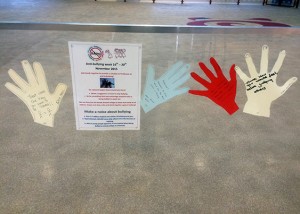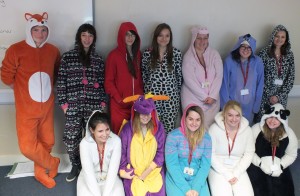By Andrew Coe, The College of Animal Welfare
Well that’s the second week half way gone and the trip so far has certainly been different to most of the group’s previous life and work experiences. So time to reflect on what we have seen and done and on whether we have made any difference to the way animals are cared for in the clinics where we have been working.
In terms of India itself I think that we’ve all been struck by the gentle and friendly welcome we’ve received from all those whose paths we’ve crossed. On the face of it Indian society is very polite and there is a calmness and serenity about the way the people go about their daily lives, never seemingly in a hurry or in a ‘flap’. Until of course they get behind the wheel of a car. Then the rules of engagement change in an instant and for those of us used to the more timid British way of driving, can seem impossibly dangerous.
Before arriving here I’d not believed tales of overtaking on blind bends but I’ve come to regard this as perfectly routine behaviour. And since everyone is aware that this is likely to happen it somehow, inexplicably, seems for the most part to work. One of our Indian hosts explained that during his first driving lesson his father told him that he must expect to find a car approaching on his side of the road around every corner. ‘We drive heavy on the brake and on the horn,’ he told us.
The clinic at Pookode threw up some interesting cases and also some challenges with regard to their clinical management. The clinicians themselves were very knowledgeable and had some excellent equipment such as a state of the art anaesthetic machine with all the monitoring ‘bells and whistles’ one could ask for. Consumables on the other hand appeared to be in restricted supply and cost was an important factor in the decision as to what drugs or needles/cannulas were routinely used. Something we don’t worry too much about in the UK.
Management of the in-patients was also different to what we were used to and this was one of the areas where the nurses made a huge improvement to the lives of the animals during the week that we were there. Most of the animals were long term residents either being strays (street dogs) when brought to the clinic, or having been abandoned by their owners after admittance. Many of them had chronic non-improving conditions such as radial paralysis or paraplegia from which there was no prospect of recovery and required either surgery (amputation in the case of the radial paralysis) or long term committed nursing/management (in the case of the paraplegic dachshund), in order to have a decent quality of life. Euthanasia is a tricky subject here with a lot of resistance to it from many students, the public and some clinicians for either cultural or religious reasons. It can make clinical decision making very difficult and brought home to us all the difficulties faced by Indian vets in this respect, and also the benefits to animal welfare back in the UK that having the option of euthanasia can provide.
Our nurses, ably supported by lecturer Karen Hibell, got to work and cleaned the kennels from top to bottom and then set about enriching the animal’s lives by initiating walks several times a day; the provision of home fashioned toys from empty plastic bottles and treats; beds of blankets or cardboard; and plenty of human interaction in the form of stroking, bathing, and food rewards. During my daily visits to the kennels I could see a huge improvement in the demeanour of the animals as the week wore on; a really positive outcome of which all the students should be very proud.
We are now down at the vet school in Thrissur, and here the work load for the clinicians is considerably greater. At times the out-patient clinics can appear chaotic and brings to mind the A and E department of a busy human hospital on a Friday night. There are several consulting tables in one big room and so there are usually numerous dogs and owners milling around either waiting to be seen or waiting for results and treatment option. The senior vets move from table to table seemingly treating several animals at the same time and issuing instructions to the vet students. That’s another big difference about India. Students rarely question the clinicians and there is huge deference shown to those in authority. Similarly, the clinicians don’t quiz the students much either so valuable teaching opportunities are lost. I’ve been asking the students some clinical questions in an attempt to teach them about some of the cases they’ve seen. At first they’ve been shy and reluctant to answer but after a bit of prompting they seem to have enjoyed the experience.
There are some diseases here that we don’t see in Britain like Babesiosis, a disease caused by a blood parasitizing protozoa Babesia gibsoni,. It’s common here and gives rise to mild anaemia, fever, lethargy and splenomegaly. It is spread by infected ticks and has a tendency to recur if not treated for a sufficient period of time. You can diagnose it by staining a blood smear made from peripheral blood, usually obtained from the ear. Lots of dogs are subclinically infected which can obscure or exacerbate other disease conditions and make a definitive diagnosis more difficult.
Well, that’s a flavour of the experience so far; wouldn’t have missed it for the world!


 Last week our students at Leeds were asked to draw around their hands on paper, cut them out and write a suggestion on how to stop bullying. These were then linked together to show that our hands can unite and stand together against bullying.
Last week our students at Leeds were asked to draw around their hands on paper, cut them out and write a suggestion on how to stop bullying. These were then linked together to show that our hands can unite and stand together against bullying.






